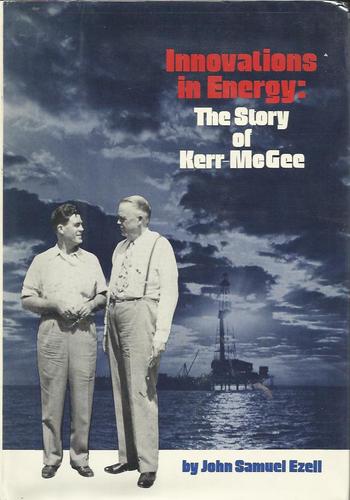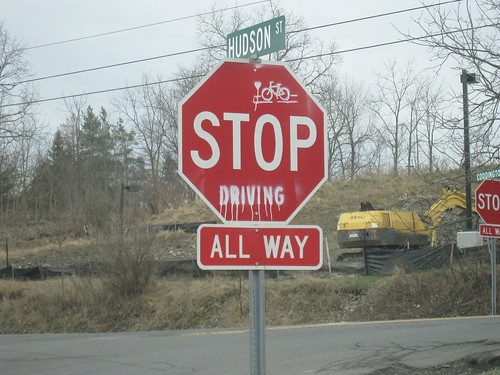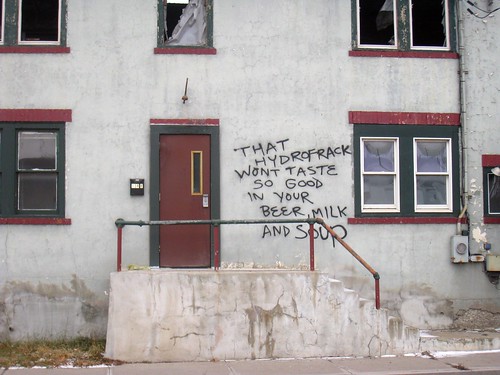Climate change leading to melting ice threatens the very existence of polar bears. On this annual International Polar Bears Day, please visit Polar Bears International to learn what you can do to help these beautiful beings. See polar bears in action at the Tundra Cam.
Showing posts with label environment. Show all posts
Showing posts with label environment. Show all posts
Wednesday, February 27, 2013
International Polar Bears Day
Climate change leading to melting ice threatens the very existence of polar bears. On this annual International Polar Bears Day, please visit Polar Bears International to learn what you can do to help these beautiful beings. See polar bears in action at the Tundra Cam.
Monday, December 10, 2012
Friday, November 23, 2012
Golden Arrow of Consumption
The fury over Black Friday and Cyber Monday has made me think of the Golden Arrow of Consumption in the materials economy so cleverly and concisely illustrated in The Story of Stuff. The sales encourage consumers to purchase more of what they don't need - or even really want - to participate in the ritual of shopping and to take advantage of the deal.
I saw some organizations asking people not to shop, but to spend time with friends and family on Friday. There is also the Buy Nothing Day campaign. I'm not sure those campaigns had the same momentum as the shopping weekend. I did find myself running to the grocery store on Thursday, before our dinner, to pick up some ingredients I'd forgotten earlier in the week. Though grateful my local store was open, I felt a significant amount of guilt that the workers were missing out on their families' celebrations for my convenience. I was also very cognizant of the strikes by Wal-Mart workers to raise awareness of their abysmal working conditions.
I myself was overwhelmed with hundreds of emails promoting sales from Thursday through Cyber Monday. Even though I know better, I found myself caught up in the mental trap: but if I don't buy it, I'm missing this great deal! I forgot to ask myself if I actually wanted the product advertised, not to mention if I needed it. (No, and no.)
Our frenzied shopping cannot bring us happiness. Even worse, laborers at home and abroad, animals, and the environment suffer from our consumer culture. A significant percentage of municipal solid waste comes from packaging (14 million tons of plastic packaging in the United States alone, according to the EPA).
I'm not saying that you shouldn't shop. I certainly am not saying I'm done with shopping. However, I resolve to be mindful about what I purchase. I hope you will, too. Please watch The Story of Stuff so that you understand all that precedes and follows the act of consumption.
I saw some organizations asking people not to shop, but to spend time with friends and family on Friday. There is also the Buy Nothing Day campaign. I'm not sure those campaigns had the same momentum as the shopping weekend. I did find myself running to the grocery store on Thursday, before our dinner, to pick up some ingredients I'd forgotten earlier in the week. Though grateful my local store was open, I felt a significant amount of guilt that the workers were missing out on their families' celebrations for my convenience. I was also very cognizant of the strikes by Wal-Mart workers to raise awareness of their abysmal working conditions.
I myself was overwhelmed with hundreds of emails promoting sales from Thursday through Cyber Monday. Even though I know better, I found myself caught up in the mental trap: but if I don't buy it, I'm missing this great deal! I forgot to ask myself if I actually wanted the product advertised, not to mention if I needed it. (No, and no.)
Our frenzied shopping cannot bring us happiness. Even worse, laborers at home and abroad, animals, and the environment suffer from our consumer culture. A significant percentage of municipal solid waste comes from packaging (14 million tons of plastic packaging in the United States alone, according to the EPA).
I'm not saying that you shouldn't shop. I certainly am not saying I'm done with shopping. However, I resolve to be mindful about what I purchase. I hope you will, too. Please watch The Story of Stuff so that you understand all that precedes and follows the act of consumption.
Saturday, August 11, 2012
Energy Problem
Only the most blindly optimistic deny the existence of an "energy problem," and nostalgia for the golden age of cheap fuels has already begun.
Sounds familiar, like something you might hear an environmental activist or political pundit say on the cable news channels? You might be surprised to learn that this quote came from a 1979 book about the Kerr-McGee Corporation. At the time, oil was $20 a barrel and gas $1 a gallon. Now, we see those as the golden days.
We haven't seemed to learn much in the time since Innovations in Energy was published. We still lament the costs of energy - and the damage convention fuel inflicts on the environment - but fail to change our behavior. Fossil fuels have significant subsidies from the U.S. government, while renewable energy programs gain only a fraction of support. The military, realizing that dependence on foreign fuel is a security issue, has attempted to increase its use of renewable energy sources, but is stymied by Congress (Ashbrook). Instead, we drill in ever more delicate areas, such as the Arctic region, or we pump hazardous fluid into the ground in the attempt to extract fuel sources. I wonder when things will be bad enough we will change our ways.
Saturday, July 21, 2012
Tuesday, July 3, 2012
Trash Walks

When Walter, Norman, and I take our twice daily walks, we usually find and pick up lots of litter along State Street. Some of it is from careless drivers and pedestrians who throw trash along the road, but other comes from inefficiencies in the waste management system. (I found a piece of mail we'd put in recycling down the street the other day.)
During IABS in Asheville, I spent an afternoon working with Asheville Greenworks to help clean Hominy Stream with a few other IABS volunteers. Some of us helped remove invasive plants; others walked the stream to take out trash. Embedded in the creek bed, we found a carburetor, part of a car's bucket seat, and a plastic raft along with numerous aluminum cans.
One of the volunteers, Melissa, had once lived in Cincinnati, and she said that she had on occasion taken her sons on "trash walks" in the city. The walks served a number of purposes: they got to spend time together, they engaged in physical activity, they learned about the city, they saw the negative effects humans can have on the natural and urban landscapes, and they contributed to a solution. While I don't think Walter and Norman get the same philosophical perspective on our trash walks, we do try to make a small positive impact.
Remember not to litter, pack up your trash and recycling well before putting it out for collection, and take your kids, dogs, or friends on trash walks in your area!
Saturday, May 5, 2012
Connect the Dots
 |
| Photo by Adrian Williams |
Groups all over the world got together to "connect the dots" and show how climate change is related to abnormal weather, storms, droughts, changes in the sea level, and wildfires. You will be touched, if not inspired, by the the images if you visit the gallery of photos.
Sunday, April 22, 2012
Tuesday, December 20, 2011
Monday, October 31, 2011
Seven Billion
There are now seven billion people in the world today, according to The New York Times. I was number 3,940,422,252. Want to know your place among the many? Check out the population counter at BBC News.
The Center for Biological Diversity, according to the Times, is the only group that is linking the population explosion to environmental issues. The paper reports, "A study published last year in the Proceedings of the National Academy of Sciences showed how slowing the country’s population growth rate to 1.5 births per woman from 2.0 could result in a 10 percent drop in greenhouse gas emissions by midcentury and a 33 percent drop by the end of the century."
The Center for Biological Diversity, according to the Times, is the only group that is linking the population explosion to environmental issues. The paper reports, "A study published last year in the Proceedings of the National Academy of Sciences showed how slowing the country’s population growth rate to 1.5 births per woman from 2.0 could result in a 10 percent drop in greenhouse gas emissions by midcentury and a 33 percent drop by the end of the century."
Sunday, October 16, 2011
Quotation of the Day
"Wilderness is not a luxury but a necessity of the human spirit, and as vital to our lives as water and good bread. A civilization, which destroys what little remains of the wild, the spare, the original, is cutting itself off from its origins and betraying the principle of civilization itself."
~Edward Abbey, Desert Solitaire
Thursday, September 15, 2011
Fracking Turns Water Into Posion
Sandra Steingraber, a Distinguished Scholar in Residence at Ithaca College, was one of 10 recipients of the prestigious Heinz Award which come with a $100,000 cash prize. (See press release.) Steingraber has written a powerful response explaining what she plans to do with her award.
The Heinz Award and What I Plan to Do With It
–Sandra Steingraber
I’m thrilled to receive a Heinz Award in recognition of my research and writing on environmental health. This is work made possible by my residency as a scholar within the Department of Environmental Studies at Ithaca College. Many past and present Heinz Award winners are personal heroes of mine–and Teresa Heinz herself is a champion of women’s environmental health–so this recognition carries special meaning for me. And it comes with a $100,000 unrestricted cash prize. Which is stunning.
As a bladder cancer survivor of 32 years, I’m intimately familiar with two kinds of uncertainty: the kind that comes while waiting for results from the pathology and radiology labs and the kind that is created by the medical insurance industry who decides whether or not to pay the pathology and radiology bills. Over the years, I’ve learned to analyze data and raise children while surrounded by medical and financial insecurities. It’s a high-wire act.
But as an ecologist, I’m aware of a much larger insecurity: the one created by our nation’s ruinous dependency on fossil fuels in all their forms. When we light them on fire, we fill the atmosphere with heat-trapping gases that are destablizing the climate and acidifying the oceans (whose plankton stocks provide us half of the oxygen we breathe). When we use fossil fuels as feedstocks to make materials such as pesticides and solvents, we create toxic substances that trespass into our children’s bodies (where they raises risks for cancer, asthma, infertility, and learning disorders).
Emancipation from our terrible enslavement to fossil fuels is possible. The best science shows us that the United States could, within two decades, entirely run on green, renewable energy if we chose to dedicate ourselves to that course [1]. But, right now, that is not the trail we are blazing.
Instead, evermore extreme and toxic methods are being deployed to blast fossilized carbon from the earth. We are blowing up mountains to get at coal, felling boreal forests to get at tar, and siphoning oil from the ocean deep. Most ominously, through the process called fracking, we are shattering the very bedrock of our nation to get at the petrified bubbles of methane trapped inside.
Fracking turns fresh water into poison. It fills our air with smog, our roadways with 18-wheelers hauling hazardous materials, and our fields and pastures with pipelines and toxic pits.
I am therefore announcing my intent to devote my Heinz Award to the fight against hydrofracking in upstate New York, where I live with my husband and our two children. Some might look at my small house (with its mismatched furniture) or my small bank accounts (with their absence of a college fund or a retirement plan) and question my priorities. But the bodies of my children are the rearranged molecules of the air, water, and food streaming through them. As their mother, there is no more important investment that I could make right now than to support the fight for the integrity of the ecological system that makes their lives possible. As legal scholar Joseph Guth reminds us, a functioning biosphere is worth everything we have [2].
This summer I traveled through the western United States and saw firsthand the devastation that fracking creates. In drought-crippled Texas where crops withered in the fields, I read a hand-lettered sign in a front yard that said, “I NEED WATER. U HAUL. I PAY. “ And still the fracking trucks rolled on, carrying water to the gas wells.
This is the logic of drug addicts, not science.
I also stood on the courthouse steps in Salt Lake City while climate activist Tim DeChristopher was sentenced to two years in federal prison for an act of civil disobedience that halted the leasing of public land for gas and oil drilling near Arches National Park. Before he was hauled away by federal marshals, Tim said, “This is what love looks like.”
After two months of travel, my children and I arrived home to the still unfractured state of New York. After stopping at a local farm stand to buy bread, tomatoes, cheese, and peaches for dinner, we celebrated our return along the vineyard-and-waterfall-lined shore of Cayuga Lake. I watched my son skip stones across its surface. Under his feet lay the aquifer that provides drinking water to our village.
This is what security looks like. Please join me in the struggle to defend the economy and ecology of upstate New York. Bring what you can.
Sources:
1. M.Z. Jacobson and M.A. Delucci, “A Path to Sustainable Energy by 2030,” Scientific American 301 (2009): 58-65.
2. “The Earth’s biosphere seems almost magically suited to human beings, and indeed it is, for we evolved through eons of intimate immersion within it. Many of us are animated by moral and religious impulses to treasure and respect the creation that sustains us. We cannot live well without a functioning biosphere, and so it is worth everything we have.” Joseph H. Guth, “Law for the Ecological Age,” Vermont Journal of Environmental Law, vol. 9.
Meanwhile, gas companies from out of state are suing local municipalities that have instituted bans on fracking.(Ithaca Journal).
The Heinz Award and What I Plan to Do With It
–Sandra Steingraber
I’m thrilled to receive a Heinz Award in recognition of my research and writing on environmental health. This is work made possible by my residency as a scholar within the Department of Environmental Studies at Ithaca College. Many past and present Heinz Award winners are personal heroes of mine–and Teresa Heinz herself is a champion of women’s environmental health–so this recognition carries special meaning for me. And it comes with a $100,000 unrestricted cash prize. Which is stunning.
As a bladder cancer survivor of 32 years, I’m intimately familiar with two kinds of uncertainty: the kind that comes while waiting for results from the pathology and radiology labs and the kind that is created by the medical insurance industry who decides whether or not to pay the pathology and radiology bills. Over the years, I’ve learned to analyze data and raise children while surrounded by medical and financial insecurities. It’s a high-wire act.
But as an ecologist, I’m aware of a much larger insecurity: the one created by our nation’s ruinous dependency on fossil fuels in all their forms. When we light them on fire, we fill the atmosphere with heat-trapping gases that are destablizing the climate and acidifying the oceans (whose plankton stocks provide us half of the oxygen we breathe). When we use fossil fuels as feedstocks to make materials such as pesticides and solvents, we create toxic substances that trespass into our children’s bodies (where they raises risks for cancer, asthma, infertility, and learning disorders).
Emancipation from our terrible enslavement to fossil fuels is possible. The best science shows us that the United States could, within two decades, entirely run on green, renewable energy if we chose to dedicate ourselves to that course [1]. But, right now, that is not the trail we are blazing.
Instead, evermore extreme and toxic methods are being deployed to blast fossilized carbon from the earth. We are blowing up mountains to get at coal, felling boreal forests to get at tar, and siphoning oil from the ocean deep. Most ominously, through the process called fracking, we are shattering the very bedrock of our nation to get at the petrified bubbles of methane trapped inside.
Fracking turns fresh water into poison. It fills our air with smog, our roadways with 18-wheelers hauling hazardous materials, and our fields and pastures with pipelines and toxic pits.
I am therefore announcing my intent to devote my Heinz Award to the fight against hydrofracking in upstate New York, where I live with my husband and our two children. Some might look at my small house (with its mismatched furniture) or my small bank accounts (with their absence of a college fund or a retirement plan) and question my priorities. But the bodies of my children are the rearranged molecules of the air, water, and food streaming through them. As their mother, there is no more important investment that I could make right now than to support the fight for the integrity of the ecological system that makes their lives possible. As legal scholar Joseph Guth reminds us, a functioning biosphere is worth everything we have [2].
This summer I traveled through the western United States and saw firsthand the devastation that fracking creates. In drought-crippled Texas where crops withered in the fields, I read a hand-lettered sign in a front yard that said, “I NEED WATER. U HAUL. I PAY. “ And still the fracking trucks rolled on, carrying water to the gas wells.
This is the logic of drug addicts, not science.
I also stood on the courthouse steps in Salt Lake City while climate activist Tim DeChristopher was sentenced to two years in federal prison for an act of civil disobedience that halted the leasing of public land for gas and oil drilling near Arches National Park. Before he was hauled away by federal marshals, Tim said, “This is what love looks like.”
After two months of travel, my children and I arrived home to the still unfractured state of New York. After stopping at a local farm stand to buy bread, tomatoes, cheese, and peaches for dinner, we celebrated our return along the vineyard-and-waterfall-lined shore of Cayuga Lake. I watched my son skip stones across its surface. Under his feet lay the aquifer that provides drinking water to our village.
This is what security looks like. Please join me in the struggle to defend the economy and ecology of upstate New York. Bring what you can.
Sources:
1. M.Z. Jacobson and M.A. Delucci, “A Path to Sustainable Energy by 2030,” Scientific American 301 (2009): 58-65.
2. “The Earth’s biosphere seems almost magically suited to human beings, and indeed it is, for we evolved through eons of intimate immersion within it. Many of us are animated by moral and religious impulses to treasure and respect the creation that sustains us. We cannot live well without a functioning biosphere, and so it is worth everything we have.” Joseph H. Guth, “Law for the Ecological Age,” Vermont Journal of Environmental Law, vol. 9.
Meanwhile, gas companies from out of state are suing local municipalities that have instituted bans on fracking.(Ithaca Journal).
Thursday, August 25, 2011
Asking for Disaster
Suffer through the ironically place Exxon advertisement promoting fracking to see a story on the proposed Tar Sands pipeline featuring an interview from Bill McKibben, who is trying with some success to inject principles of civil disobedience into the environmental movement. I found McKibben extremely inspiring when he visited Ithaca College last year.
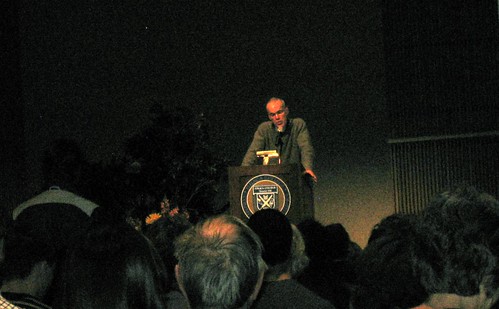
I am glad that McKibben and other leaders in the environmental movement are protesting the pipeline in DC, gaining media coverage, and educating the public. I wish I were there. I hope his words inspire you.
At the same time, I believe this story is written. The pipeline will be constructed, in 10, 15, 20 years, it will burst, because, don't kid yourself, it will, and the animals and environment will suffer. It will happen. It is inevitable. Remember this?
What about this?
Like this vision of the future?
Because as a whole we are selfish and short-sighted, I expect the pipeline will be approved, and when we face a disaster on the scale of the BP oil spill - or worse - we'll be shocked and ask how did this possibly happen? It's so sad and tragic. But if you support the pipeline, or if you do nothing to stop it, you are saying, my short-term economic comfort is more important to me than anything else. I know you don't believe that, right? Prove it!
It is our actions - YOUR ACTIONS - today that can prevent a future disaster. Go to Tar Sands Actions RIGHT NOW. Sign the petition and donate money if you can. Send this letter to your friends and family. Learn more about the problems inherent in the pipeline at Dirty Oil Sands. Know that you did everything in your power to prevent the suffering you surely abhor.
Sunday, August 21, 2011
Quotation of the Day: Current Events Edition
Ten year-old Ta'Kaiya Blaney, after studying the environmental effects of the proposed TransCanada Keystone XL Pipeline, has worked to prevent its construction, including releasing a song to raise awareness. Ta'Kaiya has more sense than most business and political leaders. On our side of the border, a group is conducting civil disobedience in Washington DC in the hopes our leaders will not agree to allow the pipeline in the U.S. Please visit Tar Sands Action to support the cause and learn what you can do to help.
“Oil pipelines and tankers will give people jobs, but if there is an oil spill like the [BP spill] in the Gulf of Mexico, that will take other people’s jobs and the wildlife will die,”
~Ta’Kaiya Blaney
Read article at Yes Magazine.
Wednesday, August 10, 2011
Saturday, July 30, 2011
Ford Rogue Factory
Perhaps only a management professor can get as excited as I was to take a tour of the Ford Rogue Factory, where Ford F-150 trucks are manufactured. The building achieved a LEED Gold certification from the U.S. Building Council for its incorporation of eco-friendly features, such as the large vegetated roof pictured below. The grounds are good for both the environment, wildlife, and the workers. In addition to viewing the features of the factory, we spent time on the 1/3 mile viewing deck above the factory floor where we could see the workers assemble the trucks. Since job design is a topic I cover in class, I was fascinated to watch how each station was organized and how each worker moved to complete their responsibility. Oh, and there were historical cars, too!

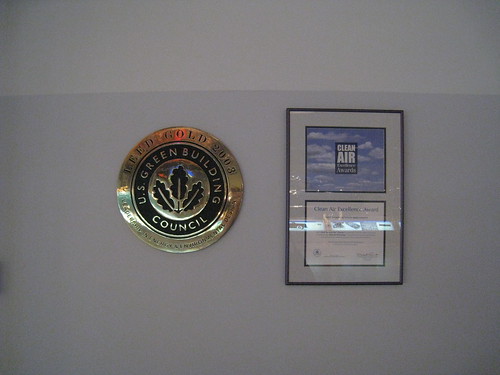
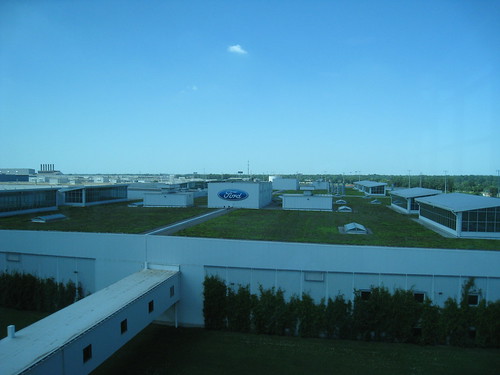
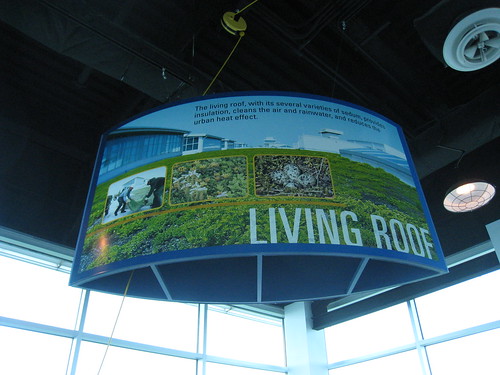
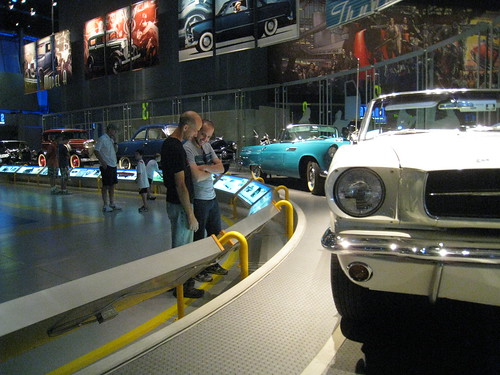





Thursday, April 14, 2011
Wednesday, December 29, 2010
Monday, December 27, 2010
b2p
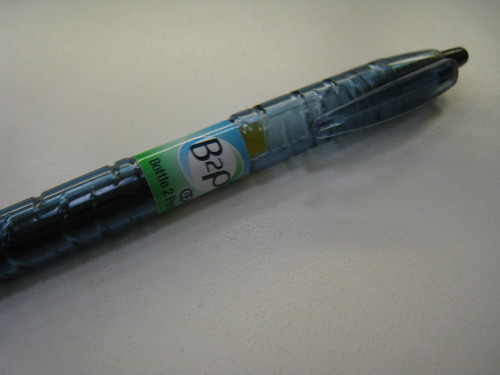
When Mark Buckley visited school to give a very interesting presentation, in passing I mentioned to two of his Staples colleagues that my Diet Coke addiction had negative environmental implications. They responded that the B2P pen helped ease the effects of all those discarded bottles. Each pen includes 89% recycled PET (about the equivalent of two bottles). Mr. Buckley kindly let me take his sample pen, pictured above.
Manufactured by the Pilot Corporation, the retractable (and cute) pen does have very nice, smooth writing. It does have a different feel to it in my hand, but that may be due to the less contoured shape of the instrument as much as the material. The one I have is medium (.7) in blue. It's also available in red, green, and black, as well as in fine (.5). They need to add purple ink to the line!
The Pilot Corporation is on PETA's list of companies that do not test on animals, so it's animal-friendly as well as eco-friendly.
Pilot's B2P site
Sunday, December 5, 2010
Quotation of the Day
"Feeling that morality has nothing to do with the way you use the resources of this world is an idea that can't persist any longer. If it does, then we won't."
~Barbara Kingsolver
Subscribe to:
Posts (Atom)


